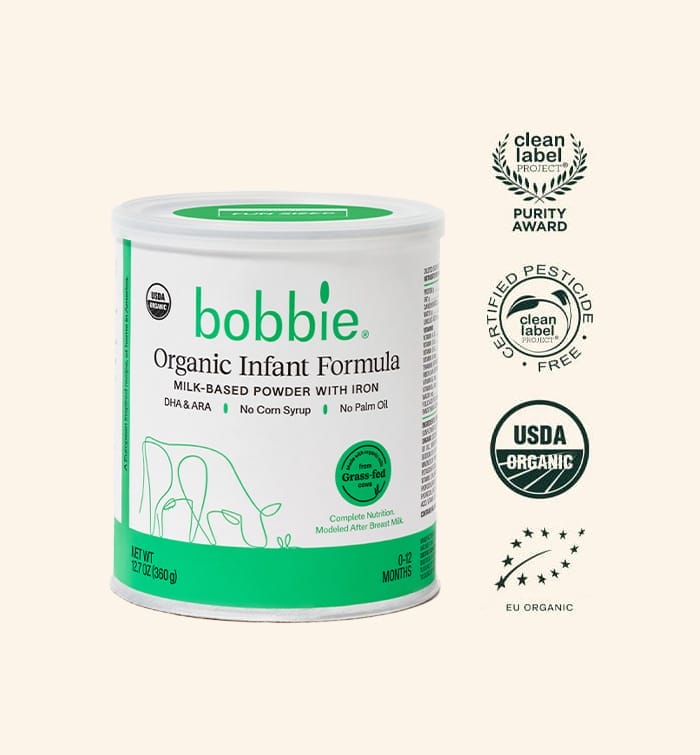We are proud to say that these posts are not sponsored. Our editorial team of Bobbie moms and writers personally select each featured product. If you buy something through our links, we may earn an affiliate commission, at no cost to you.
Congratulations! Your bundle of joy is finally here! You’ve prepared for your little one’s arrival for months: nursery is ready, baby clothes are washed, high chair assembled. You have taken care of yourself and your baby for 9 months: no booze, raw seafood or weird cheeses; you’ve been exercising (OK maybe just walking but that counts) and eating well. And now that baby is here, what next?
Your plan has been to exclusively breastfeed, but what if this is not what’s best for you or your baby? When is it OK to supplement your breastfeeding baby with baby formula? The first few weeks of an infant’s life are crucial, and exclusive breastfeeding might not be feasible or even advisable. When your expectation as a mom is to exclusively breastfeed, the thought of supplementing with formula might come with feelings of guilt, fear, and doubt in your ability to feed your baby. Well, let me ease your fears, and reassure you that there is NO need for guilt!
As pediatricians, our goal is to ensure the health and well-being of your baby, and sometimes that means supplementing, especially during the first weeks of life. The good news is, more research is now showing that “early limited formula supplementation” may in fact preserve successful breastfeeding in the future.
- When would a pediatrician recommend supplementation for a breastfed infant?
- Conditions that predispose moms to inadequate early milk supply
- Supplementation might be indicated if a baby shows any of these signs
- How much should you feed your baby at a time?
- How much should you feed your baby at a time?
- Using Formula is OK!
Supplementing with baby formula
Sometimes breastfed babies need a little formula, especially in the first few weeks of life. This doesn’t have to put an end to your breastfeeding journey and you should feel no guilt for doing what is best for you and your baby.

Shop Bobbie Organic Infant Formula
Bobbie Organic Infant Formula is a USDA Organic, EU-style infant formula that meets all FDA requirements. It is a complete nutrition milk-based powder modeled after breast milk and is easy on tummies. It is non-GMO and doesn't have corn syrup, palm oil, or maltodextrin. Learn more about Bobbie.
When would a pediatrician recommend supplementation for a breastfed infant?
There are maternal and infant factors that support the decision to supplement a newborn during the first days-week of life. The goal is to avoid hospitalization of a newborn due to insufficient breast milk intake and preserve future breastfeeding.
Maternal factors: Conditions that can predispose moms to inadequate early milk supply
- Delayed milk production – caused by previous breast surgery, retained placenta or postpartum hemorrhage (Sheehan’s syndrome)
- Primary lactation failure -the inability to produce sufficient breast milk, which occurs in 5%- 15% of breastfeeding moms
- Intolerable pain when nursing
- Maternal illness resulting in separation from the infant
- Maternal medications considered unsafe in breastfeeding
Infant factors: Supplementation might be indicated if a baby shows these signs
- Attempting to breastfeed for more than 30 minutes (both you and baby are exhausted)
- Low blood sugar (hypoglycemia) – jittery hands, low body temperature, inconsolable, high-pitched crying
- Excessive sleepiness – baby is difficult to arouse, lethargic, not waking for feedings every 3 hours
- Weight loss exceeding 7% at any time but particularly during the first week of life
- Signs of dehydration: reduced wet and dirty diapers, no wet diapers in six hours, dry lips and mouth
- Significant jaundice – yellowing of the skin and/or eyes, especially below the face
What should you supplement breast milk with?
Your baby can be supplemented with your donor breast milk or baby formula. Baby can be supplemented via an SNS tube feeding system, syringe or spoon feeding, or a bottle with a slow flow and a “breastfeeding-friendly” nipple. Make sure to check in with a board-certified lactation consultant.
How much should you feed your baby at a time?
A breastfed baby should be supplemented with 10-15 mL of breast milk or formula per feed. Discuss with your lactation consultant and pediatrician or health care provider. You can mix breast milk and formula in the same bottle.
Using Formula is OK!
Remember, if it has been determined that your baby needs supplementation, even with formula:
- You are NOT a failure as a mother, and you should feel NO guilt! In fact, you are doing what is best for your baby, so way to go mom!
- Supplementation will not ruin breastfeeding, in fact, new research shows it might help preserve it.
- Breastfeeding is not an all or nothing, and any breastfeeding is beneficial to you and your baby. So whatever you decide to do after that first week, your baby thanks you!
Hang in there, things will get easier! Rely on your mother’s instinct and remember you should seek advice but you don’t need to seek permission on how to feed your baby, ever!

Shop Bobbie Organic Infant Formula
Bobbie Organic Infant Formula is a USDA Organic, EU-style infant formula that meets all FDA requirements. It is a complete nutrition milk-based powder modeled after breast milk and is easy on tummies. It is non-GMO and doesn't have corn syrup, palm oil, or maltodextrin. Learn more about Bobbie.

